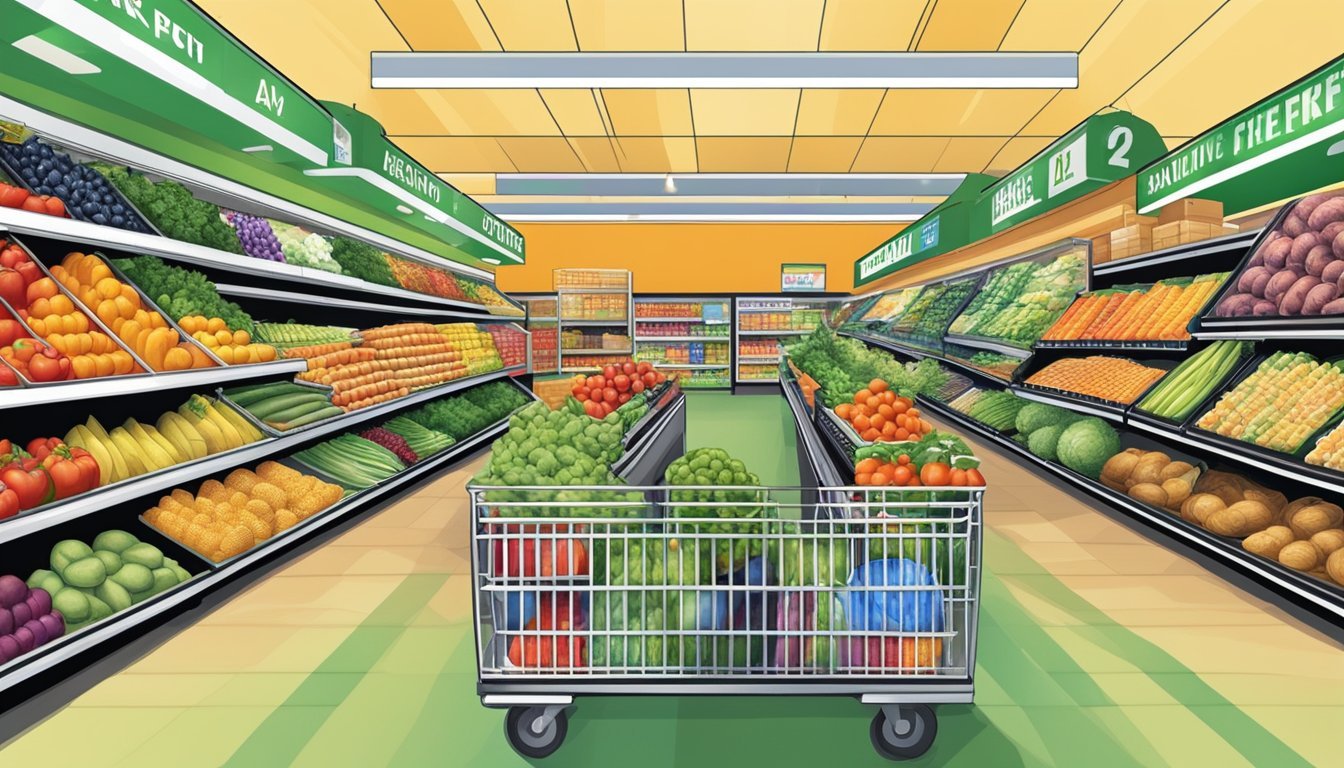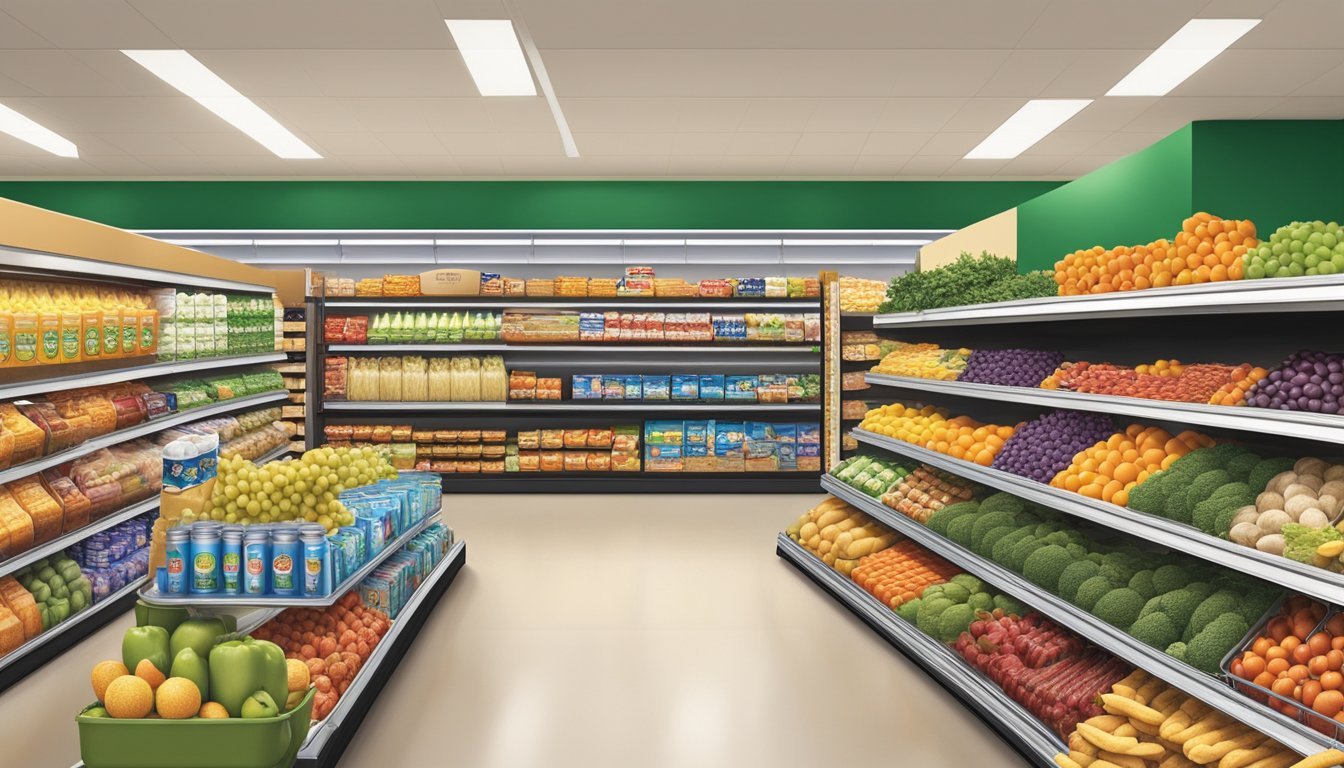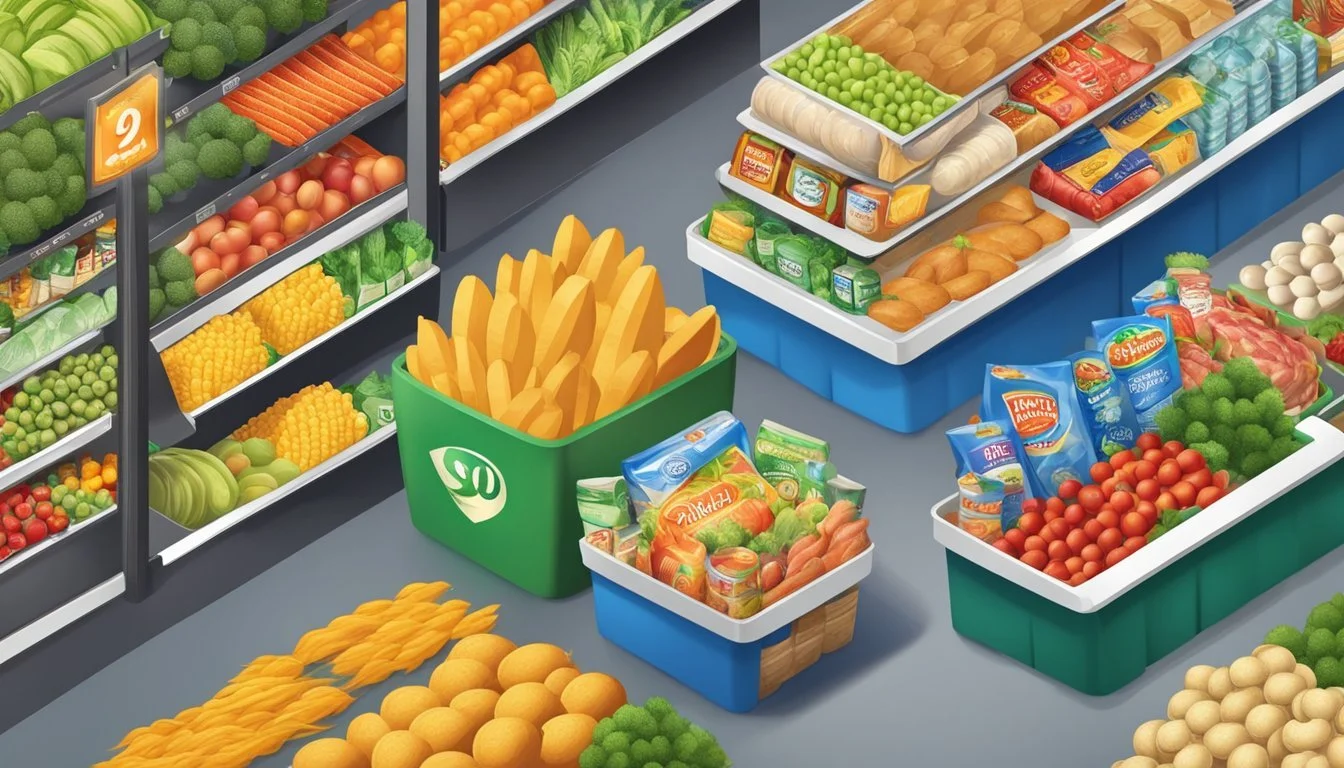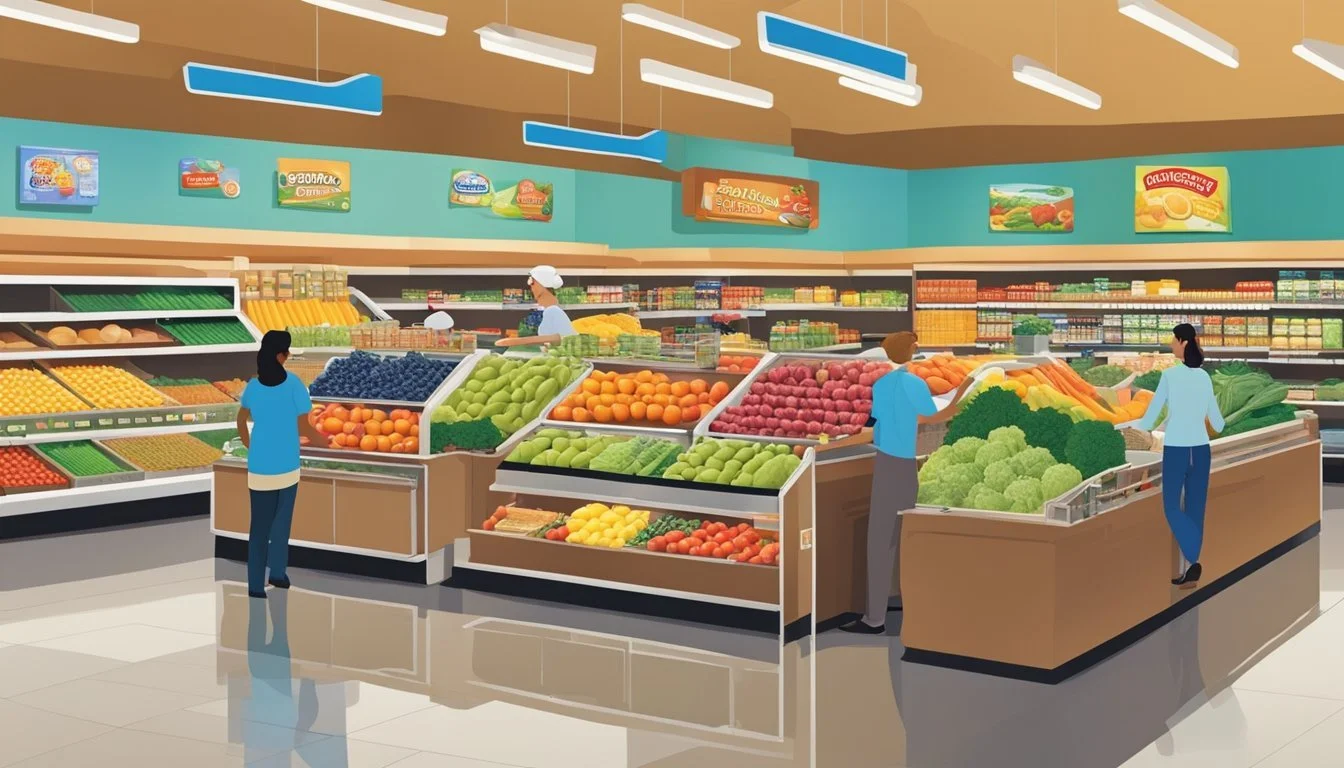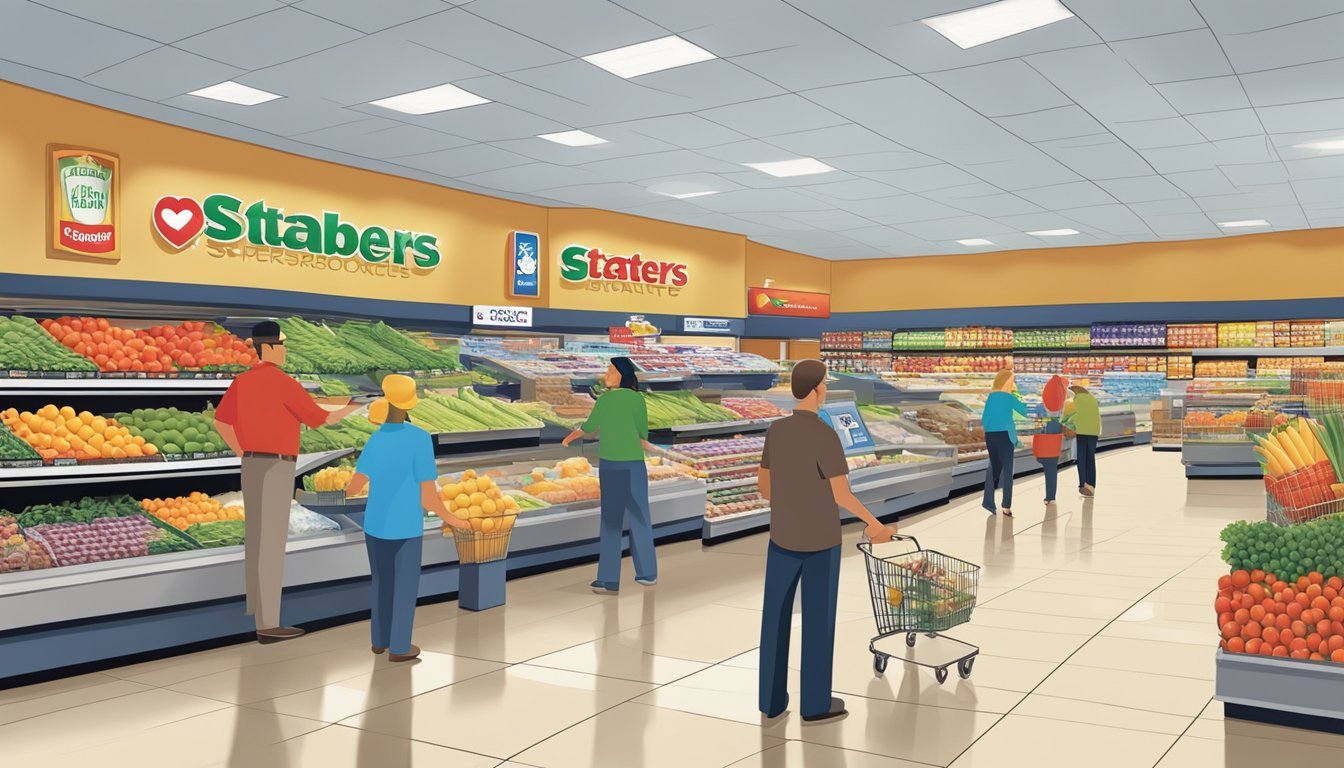Lucky Supermarkets vs Stater Bros. Markets
A Comprehensive Comparison of Prices, Selection, and Service
Lucky Supermarkets and Stater Bros. Markets are two prominent grocery chains serving different regions of the United States. Both offer a range of products and services to meet customers' daily shopping needs.
When comparing Lucky Supermarkets and Stater Bros. Markets, Stater Bros. appears to have an edge in terms of meat quality and customer service. Consumer Reports ranked Stater Bros. ninth in their 2017 survey of best places to grocery shop, highlighting the chain's competitive prices and high-quality meat and poultry offerings.
While Lucky Supermarkets has its own strengths, specific information about their performance in comparison to Stater Bros. is limited. Shoppers looking for the best value may need to consider factors such as location, product selection, and personal preferences when choosing between these two grocery chains.
History and Overview
Lucky Supermarkets and Stater Bros. Markets have deep roots in California's grocery landscape. Both chains emerged during challenging economic times and grew to become significant players in the supermarket industry, particularly in Southern California.
History of Lucky Supermarkets
Lucky Stores began in 1935 when Charles Crouch opened the first location in San Leandro, California. The company quickly expanded throughout the Bay Area, becoming known for its innovative approach to grocery retail. In 1947, Lucky opened a flagship store in San Leandro that featured a coffee shop, marking a shift towards larger, more comprehensive supermarkets.
Lucky pioneered self-service shopping and introduced wider aisles and checkout stands. The chain grew rapidly in the post-war years, expanding its presence across California. By the 1980s, Lucky had become one of the largest supermarket chains in the state.
In 1998, Lucky was acquired by Albertsons, and the Lucky brand disappeared for over a decade. However, in 2006, the name was revived in Northern California under new ownership.
Background of Stater Bros. Markets
Stater Bros. Markets was founded on August 17, 1936, by twin brothers Cleo and Leo Stater in Yucaipa, California. The brothers started their business during the Great Depression, purchasing a small grocery store with a $600 down payment.
From its humble beginnings, Stater Bros. steadily expanded its presence in Southern California. The company focused on providing quality products and exceptional customer service, which helped build a loyal customer base.
By 2024, Stater Bros. operates 169 supermarkets across seven Southern California counties. The chain employs approximately 18,000 people and remains headquartered in San Bernardino. Stater Bros. has maintained its status as a privately held company throughout its history, allowing it to focus on long-term growth and community engagement rather than short-term profits.
Store Presence and Location Analysis
Stater Bros. Markets and Lucky Supermarkets have distinct geographical footprints and local market influences. Their store locations and expansion strategies shape their accessibility and impact on communities.
Geographical Footprint
Stater Bros. Markets maintains a strong presence in Southern California. As of August 2024, the chain operates 169 stores, all located within California. This concentrated approach allows Stater Bros. to focus on serving specific regional markets.
Lucky Supermarkets, in contrast, has a more dispersed presence. The chain operates stores in multiple states, primarily in the Western United States. This wider geographical spread gives Lucky Supermarkets exposure to diverse market conditions and consumer preferences.
Local Market Influence
Stater Bros. Markets has cultivated deep roots in its core Southern California market. The company's long-standing presence has helped it build strong relationships with local suppliers and communities. This local focus allows Stater Bros. to tailor its offerings to regional tastes and preferences.
Lucky Supermarkets leverages its multi-state presence to adapt to various local markets. The chain's ability to operate in different regions enables it to diversify its revenue streams and gain insights from different consumer behaviors across states.
Accessibility and Expansion
Stater Bros. Markets prioritizes accessibility within its California market. The company strategically locates stores in both urban and suburban areas to serve a wide range of customers. Its focused geographical approach allows for efficient supply chain management and targeted marketing efforts.
Lucky Supermarkets takes a broader approach to expansion. The chain seeks opportunities in various states, potentially reaching a larger customer base. This strategy may present challenges in terms of supply chain logistics but offers the potential for greater market penetration and brand recognition across a wider area.
Both chains continue to evaluate new locations for potential expansion, balancing factors such as population density, competition, and local economic conditions.
Product Range and Brand Offerings
Lucky Supermarkets and Stater Bros. Markets offer diverse product selections, including exclusive brands and partnerships. Both stores prioritize fresh produce and quality meats, but their offerings differ in key areas.
Exclusive Brands and Partnerships
Lucky Supermarkets features its signature "Lucky You" private label products across various categories. These items offer value-driven alternatives to national brands. The store also partners with local suppliers to provide regional specialties.
Stater Bros. Markets carries its own "Stater Bros." brand products, spanning groceries, household items, and frozen foods. The chain collaborates with California farmers to source fresh produce, supporting local agriculture.
Both stores stock popular national brands alongside their private labels, giving customers a range of options at different price points.
Breadth of Product Lines
Lucky Supermarkets boasts an extensive international foods section, catering to diverse culinary preferences. The store offers a wide array of Asian, Hispanic, and European products.
Stater Bros. Markets focuses on a more traditional American supermarket selection. Their product lines include:
Pantry staples
Frozen foods
Dairy products
Bakery items
Health and beauty products
Both chains provide organic and natural food options, though Lucky tends to have a broader selection in this category.
Quality of Produce and Meat
Lucky Supermarkets prides itself on its fresh produce section, featuring a variety of seasonal fruits and vegetables. The store emphasizes locally sourced items when available.
Stater Bros. Markets is known for its high-quality meat department. The chain offers:
USDA Choice beef
Fresh poultry
Pork products
Seafood options
According to Consumer Reports, Stater Bros. received praise for the quality of its meat and poultry. The store's butchers provide custom cuts and personalized service.
Both chains prioritize freshness in their produce sections, but Stater Bros. appears to have an edge in meat quality and selection.
Pricing Strategies
Both Lucky Supermarkets and Stater Bros. Markets employ various pricing strategies to attract and retain customers. These approaches aim to provide value while maintaining profitability.
Everyday Pricing and Discounts
Lucky Supermarkets focuses on competitive everyday prices across their product range. They regularly offer weekly specials and discounts on popular items to drive foot traffic.
Stater Bros. Markets takes a similar approach, emphasizing low prices as a core part of their brand identity. They frequently run promotions on staple goods and seasonal products.
Both chains use loss leaders - items priced at or below cost - to draw customers into stores. This tactic aims to increase overall basket size and sales volume.
Loyalty Programs and Savings
Lucky Supermarkets operates a digital rewards program. Members earn points on purchases which can be redeemed for discounts on future shopping trips.
The program also provides personalized coupons and exclusive deals to members via email and their mobile app.
Stater Bros. Markets offers a similar loyalty scheme. Their program includes digital coupons, gas rewards, and special pricing for members on select items throughout the store.
Both chains use these programs to gather customer data, enabling targeted marketing and more effective pricing strategies.
Customer Service and Shopping Experience
Both Lucky Supermarkets and Stater Bros. Markets prioritize customer satisfaction, offering various services to enhance the shopping experience. Their approaches differ in certain aspects, catering to different customer preferences.
In-Store Services and Atmosphere
Stater Bros. Markets excels in customer service, ranking ninth in Consumer Reports' 2017 survey on best places to grocery shop. The staff receives praise for their helpfulness and attentiveness. Stater Bros. stores maintain a clean, organized atmosphere, making it easy for customers to navigate and find products.
Lucky Supermarkets focuses on creating a welcoming environment with a diverse product selection. They offer specialized departments, including deli counters and bakeries, providing personalized service. Both chains emphasize fresh produce and quality meats, but Stater Bros. particularly stands out for its meat department.
Online Shopping and Digital Services
Lucky Supermarkets has embraced digital technology, offering a user-friendly website and mobile app for online shopping. Customers can create shopping lists, browse weekly ads, and place orders for pickup or delivery. They accept various payment methods, including PayPal and Apple Pay.
Stater Bros. Markets has been slower to adopt online services but has made recent improvements. Their website provides information on store locations, weekly specials, and recipes. While they don't offer comprehensive online shopping, some stores provide curbside pickup options. Both chains are working to integrate more digital services to meet evolving customer needs.
Additional Amenities and Features
Lucky Supermarkets and Stater Bros. Markets offer various specialized departments and wellness-focused initiatives to enhance the shopping experience. These features cater to diverse customer needs and preferences.
Special Departments and Offerings
Lucky Supermarkets boasts a comprehensive deli section with freshly prepared meals and made-to-order sandwiches. Their meat department provides high-quality cuts and custom butcher services.
Stater Bros. Markets emphasizes their fresh produce and bakery offerings. The chain takes pride in their extensive selection of locally sourced fruits and vegetables.
Both stores feature dedicated pet aisles with a wide range of food, toys, and accessories for furry companions.
Lucky Supermarkets includes a small electronics section, offering basic gadgets and accessories. Stater Bros. Markets focuses more on household essentials rather than electronics.
Health and Wellness Focus
Lucky Supermarkets maintains a robust health and beauty section, stocking a variety of vitamins, supplements, and personal care products. The chain often hosts in-store health education events and workshops.
Stater Bros. Markets prioritizes offering organic and natural food options throughout their stores. They provide clear labeling for gluten-free, non-GMO, and other dietary-specific products.
Both chains feature pharmacy services in select locations, offering prescription fulfillment and basic health screenings. Lucky Supermarkets and Stater Bros. Markets also promote healthy living through their respective loyalty programs, offering discounts on nutritious food items.
Consumer Policies and Support
Lucky Supermarkets and Stater Bros. Markets have distinct consumer policies that impact the shopping experience. These policies cover areas like returns, price adjustments, and coupon usage, which can significantly influence customer satisfaction and loyalty.
Return and Price Adjustment Policies
Lucky Supermarkets offers a 30-day return policy for most items with a receipt. They provide full refunds or exchanges for unopened products. Perishable goods have a shorter return window of 7 days.
Stater Bros. Markets has a more flexible return policy. They accept returns without time limits, even without receipts in some cases. Their "Double the Difference" guarantee refunds twice the price difference if customers find a lower advertised price elsewhere.
Both chains offer price adjustments within 7 days of purchase if an item goes on sale. Customers must present their receipt to receive the difference.
Coupons and Competitor Policies
Lucky Supermarkets accepts manufacturer coupons and digital coupons through their mobile app. They allow stacking of one manufacturer coupon with one store coupon per item. Lucky also matches competitors' advertised prices with proof of the current ad.
Stater Bros. Markets has a similar coupon policy. They accept both paper and digital manufacturer coupons. Stater Bros. does not typically offer store coupons but frequently runs in-store promotions and weekly specials.
Neither chain currently offers specific discounts for veterans, students, teachers, or government workers. However, both stores participate in seasonal promotions that may benefit these groups.
Community Engagement and Brand Reputation
Both Lucky Supermarkets and Stater Bros. Markets prioritize community involvement and sustainability. Their efforts in these areas significantly impact their brand reputation and customer loyalty.
Local Community Involvement
Lucky Supermarkets actively participates in local events and charitable initiatives. They sponsor youth sports teams and organize food drives to support food banks in their operating areas. The company also partners with schools for educational programs on nutrition and healthy eating habits.
Stater Bros. Markets takes a community-centric approach. They contribute to local charities and support veterans' organizations. The supermarket chain hosts regular blood drives and fundraisers for various causes. Stater Bros. also provides emergency relief during natural disasters, offering supplies and support to affected communities.
Both companies maintain active Facebook pages to engage with customers and share community updates. This direct communication helps strengthen their local presence and brand recognition.
Sustainability Efforts
Lucky Supermarkets focuses on reducing food waste through partnerships with local food banks. They implement energy-efficient practices in their stores, including LED lighting and improved refrigeration systems. The company also promotes reusable bags to minimize plastic waste.
Stater Bros. Markets emphasizes environmental responsibility. They've invested in solar power installations at several locations to reduce their carbon footprint. The company runs a comprehensive recycling program for cardboard, plastics, and organic waste. Stater Bros. also offers eco-friendly product options to environmentally conscious customers.
Both chains use their Gmail newsletters to inform customers about their sustainability initiatives and encourage participation in green practices.
Store Brand Comparison and Insights
Lucky Supermarkets and Stater Bros. Markets offer their own store brands to compete with national brands. These private label products provide value and quality alternatives for budget-conscious shoppers.
Comparison of Key Criteria
Lucky's store brand focuses on affordability without compromising quality. Their products span essentials like dairy, canned goods, and frozen items. Stater Bros. offers a wider range of store brand products, including fresh produce and meats.
Quality-wise, Stater Bros. store brands receive higher ratings from consumers. Their meats and poultry are particularly praised for freshness and taste. Lucky's store brand excels in pantry staples and household items.
Price comparisons show Lucky's store brand is generally cheaper. However, Stater Bros. offers better value in perishables like dairy and produce.
Expert Reviews and Consumer Feedback
Consumer Reports ranks Stater Bros. higher overall for grocery shopping experience. Their survey highlights Stater Bros.' competitive prices and quality meats.
Customer reviews often mention Stater Bros.' friendly staff and clean stores. Lucky receives positive feedback for its low prices and convenient locations.
Expert analyses suggest Stater Bros. has a slight edge in store brand quality. Food critics praise their fresh departments, while noting Lucky's strength in packaged goods.
Nutrition experts favor Stater Bros. for offering more healthy store brand options. Lucky's store brand is commended for clear labeling and ingredient transparency.
Payment Options and Financing
Both Lucky Supermarkets and Stater Bros. Markets offer various payment methods to cater to customer preferences. They also provide some financing options to help shoppers manage their grocery expenses.
Variety of Payment Methods
Lucky Supermarkets and Stater Bros. Markets accept cash, debit cards, and major credit cards. Both chains support mobile payment options like Apple Pay and Google Pay for convenient, contactless transactions. EBT cards are accepted at both stores for SNAP benefit recipients.
Stater Bros. Markets also accepts personal checks with proper identification. Lucky Supermarkets offers a store-branded credit card that provides cashback rewards on purchases.
Both chains honor manufacturer coupons and offer digital coupons through their mobile apps or websites. These options allow customers to save money while shopping.
Financing and Installment Plans
Lucky Supermarkets partners with Afterpay to offer a "buy now, pay later" option on larger purchases. This allows customers to split payments into four interest-free installments over six weeks.
Stater Bros. Markets does not currently offer installment financing plans. However, they provide a reloadable prepaid debit card that can help customers budget their grocery spending.
Neither chain offers traditional financing options like Viabill, Greensky, or Splitit for grocery purchases. These services are more commonly found in stores selling big-ticket items.
Both stores feature modern checkout systems with self-service kiosks, helping to reduce wait times and improve the shopping experience. These systems support various payment methods and automatically apply eligible discounts.
Final Summary and Recommendations
Lucky Supermarkets and Stater Bros. Markets both offer unique shopping experiences for grocery consumers. Based on available information, Stater Bros. tends to have lower prices overall compared to Lucky Supermarkets.
Stater Bros. received higher ratings in consumer surveys for customer service and product quality. Their stores are known for cleanliness and an efficient shopping experience.
Lucky Supermarkets stands out for its wider selection of organic and specialty products. They also offer more prepared food options for shoppers seeking convenience.
For budget-conscious consumers, Stater Bros. is likely the better choice. Those prioritizing organic options and variety may prefer Lucky Supermarkets.
Both chains provide curbside pickup services, meeting the needs of customers who value convenience. Neither chain offers international shipping.
Ultimately, the best choice depends on individual preferences and priorities. Shoppers should consider factors like location, product selection, and price when deciding between these two grocery retailers.

